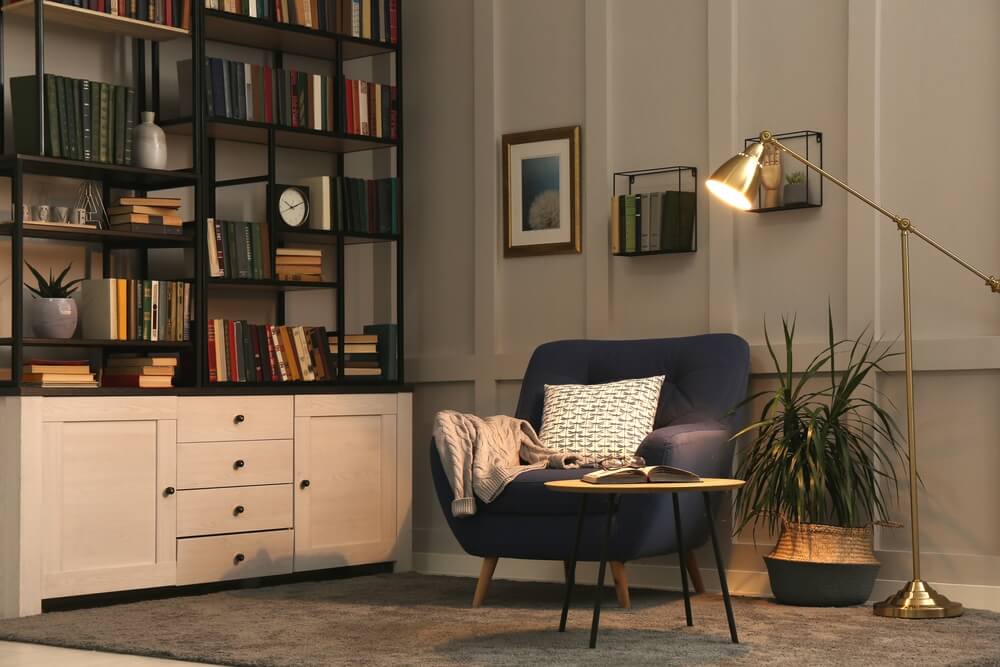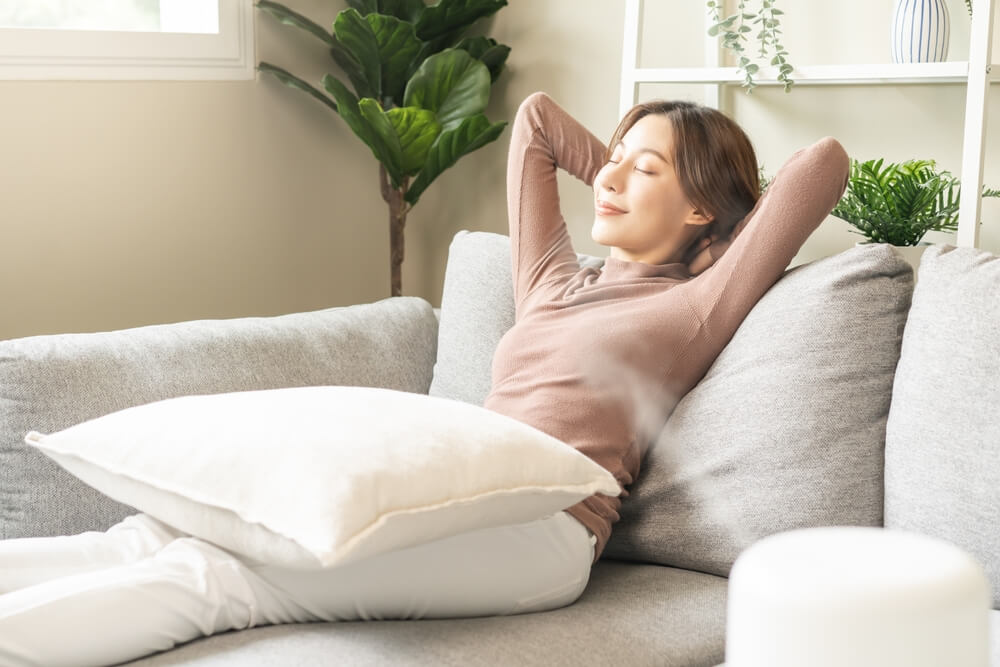Your Living Space Affects Your Mental Health


Reviewed and approved by the psychologist José Padilla
Some talk about Feng Shui and others about the psychology of space. We’re not going to delve into either of these disciplines, but we can most confidently state that your living space can affect your mental health in either a positive or negative way.
Psychology and architecture are two disciplines that might seem to be rather far removed. However, they have certain similarities and can both affect your mood. In fact, the effects that both natural and built-up spaces have on the human psyche are now being investigated. Therefore, the psychology of space is of great benefit if you’re seeking an orderly environment containing elements of peace and tranquility.
The psychology of space and how to use it to your advantage
The psychology of space is a well-studied concept. It gained great importance during the pandemic when, for reasons of public health, everyone had to stay at home.
It’s a transdisciplinary methodology that investigates the relationship between the characteristics of peoples’ living spaces and the effect these have on their behaviors and feelings of relaxation.
This field concerns how the design, organization, and decoration of your home can affect your mind. Work and study spaces such as offices and classrooms are also included.
In this article, we’re going to focus on homes, since it’s estimated that at least 75-80 percent of our lives take place where we live.
It’s certainly true that, in one way or another, your living space has an effect on your daily life. For example, living in a dark space can produce feelings of laziness.
If it’s cold too, it can even provoke feelings of fear. It’s even been confirmed that the physical environment of the home can be a potential source of stress as it can cause a reduced quality of life.
Your decor affects your mental health

The ‘energy’ of spaces and the way in which it affects human behavior isn’t only due to the way it’s organized. Our behavior is also affected by the way a space is decorated.
For example, imagine that you enter a huge room with high ceilings, large windows, and fine curtains. How do you feel? You might imagine you’re in a palace. You probably want to stand there and take it all in.
Now, imagine that you enter the same room, with the same decor but this time there’s a large painting on one of the walls. Imagine that the painting is terrifying.
It’s a dark scene and you don’t know how to interpret it. It makes you feel afraid. Do you want to stay there? Most likely, you’ll feel intimidated and the beautiful surroundings will take second place.
If you don’t want this to happen in your home or office, you need to reflect on the decoration and furniture you choose. Select those that transmit feelings of harmony, creativity, and tranquility or those that you consider most necessary and comfortable for your well-being.
Four tips to ensure your living space improves your mental health
A messy space can generate feelings of discomfort and despair. Moreover, it can reduce both your productivity and energy for simple tasks such as cooking or those that require concentration.
The psychology of space also indicates that your living space can also induce feelings of happiness, joy, energy, productivity, and, in general, well-being and comfort.
Here are four tips to ensure that your living space generates feelings of well-being in your mind.
1. Try to keep order

Have you ever heard someone say “This place doesn’t give me a good feeling”? You might even have said something similar yourself like “It’s giving me bad vibes”.
It’s not only people who are responsible for creating these bad feelings. Indeed, there are some simple elements that you might not even consider, but that can generate thoughts or feelings in you of not wanting to be there.
It’s worth bearing in mind that a house, an office, and even a classroom might be small and basic with no luxuries, but if there’s no order, it’s impossible to create a pleasant atmosphere. In fact, everything must be in place to help you feel tranquil and not feel anxious because it’s messy.
2. Bring harmony to your spaces
You don’t need expensive furniture to generate harmony in your living space. For example, if the space is small, a couple of chairs next to a small table with a book is all you need to make a harmonious reading space.
Remember that to bring harmony to your home you must keep in mind the way it’s organized, the furniture, and also the colors with which you paint the walls.
From the point of view of color psychology, white and beige tones promote tranquility and relaxation. On the other hand, blues and greens generate calm and stability by evoking a connection with nature.
3. Provide good lighting
Light is necessary for a calm mind. In closed spaces, it generates feelings of spaciousness, harmony, elegance, and tranquility, especially if it’s natural light or warm light.
Of course, depending on your daily activities, a darker environment might be necessary at times but, without a doubt, light will help create a better environment and thus promote your feelings of general well-being.
Make sure you play with the lighting in your home, more particularly your main living room, as it’s been confirmed that prolonged exposure to blue light at night can affect the body’s biological clock and cause insomnia and premature aging.
Therefore, we recommend you purchase an intelligent LED lighting system to adjust the color and light intensity in your home, particularly at bedtime.
4. Integrate nature into your home
Indoor plants and flowers can bring calm and peace of mind. This is why the so-called biophilic design has gained in popularity over recent years.
It’s a management and development system for exterior and interior environments based on the role of nature in improving people’s health and well-being.
To integrate natural elements into your home decor, we recommend indoor plants. Also, make the most of natural light, the presence of water, and good ventilation. Also, if you’re lucky enough, a direct view of outdoor green spaces generates states of inner connection and relaxation.
Your living space affects your mental health
Now that you know about the positive and negative effects of your environment and your living space, it’s time to start paying more attention to it if you want to improve your general well-being.
Try to keep your home tidy and clean, and make sure you have good lighting and plants to connect you with nature. This will make you feel secure, comfortable, and calm in the space where you spend most of your life.
All cited sources were thoroughly reviewed by our team to ensure their quality, reliability, currency, and validity. The bibliography of this article was considered reliable and of academic or scientific accuracy.
- Glynn LM, Davis EP, Luby JL, Baram TZ, Sandman CA. (2021). A predictable home environment may protect child mental health during the COVID-19 pandemic. Neurobiol Stress. 2021 Jan 6;14:100291. https://pubmed.ncbi.nlm.nih.gov/33532520/
- Paillie, F. Parkinson, J. Pantoja R. (2018). Psicología del Espacio (The Psychology of Space). Conscious Cities Anthology 2018: Human-Centred Design, Science, and Technology. https://theccd.org/article/37/psicologia-del-espacio-the-psychology-of-space/
- Schmeer KK, Yoon AJ. (2016). Home sweet home? Home physical environment and inflammation in children. Soc Sci Res. 2016 Nov;60:236-248. https://pubmed.ncbi.nlm.nih.gov/27712682/
- Lotito, F., (2009). Arquitectura psicología espacio e individuo. Revista AUS, núm. 6, 2009, pp. 12-17 https://www.redalyc.org/pdf/2817/281723479003.pdf
-
Schweitzer, M., Gilpin L., & Frampton, S., (2014). Healing Spaces: Elements of Environmental Design That Make an Impact on Health. The Journal of Alternative and Complementary Medicine. Vol. 10, No. supplement 1. https://www.liebertpub.com/doi/abs/10.1089/acm.2004.10.S-71
- Evans, G., (2003). The built environment and mental health. Journal of Urban Health volume 80, pages 536–555. https://link.springer.com/article/10.1093/jurban/jtg063
This text is provided for informational purposes only and does not replace consultation with a professional. If in doubt, consult your specialist.








